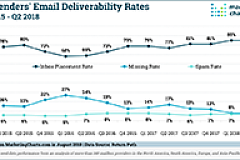 You take pride in performing at your best, but are you doing too much? Learn why overworking can hurt your company in the long run.
You take pride in performing at your best, but are you doing too much? Learn why overworking can hurt your company in the long run.
Most business owners are on the job at least 50 hours per week, which is 45 percent more than the national employee average of 34.4 hours, according to a survey by the Bureau of Labor Statistics. The reasoning is simple: The more you give, the more you get.
That's the theory, anyway.
The reality is far different. Overworking yourself and your employees can have detrimental effects on many aspects of your health and business. In fact, it's possible to have the same production output – or more – with fewer hours on the job.
It's time to work smarter, not harder. Here's a look at the downside of overworking yourself.
1. Decreased Productivity
If you want to grow your business fast, every moment matters. When the owners of competing businesses are in the office 70 hours a week, you may feel a desire to match them. It's the result of guilt heightened with a tinge of fear, believing that your hardworking competitors will outperform you and your business.
[quotes]But does more time in the office lead to more productivity?[/quotes] Not much, according to a study by Stanford University. While additional hours do lead to improved output, there are some diminishing returns.
The study found that performance gains were negligible at around 50 hours per week. And at 55 hours or more, there was virtually no productivity increase. Someone working 70 hours a week had the same output as another working just 55 hours.
But even 55 hours may be an unnecessary burden. CEO Steve Glaveski discovered that many of his employees spent their days distracted by unimportant tasks, such as checking email and sitting in meetings.
By reorganizing and prioritizing value-efficient projects, Glaveski’s employees were able to maintain the same productivity – and sometimes produced more – with 10 fewer work hours every week.
2. Health Complications
The phrase "working yourself to death" is more than an old saying. It's rooted in a very real, scientifically proven truth. Overworking yourself puts you at a higher risk of chronic illness and immediate mortality.
After poring over the results of one million data points, researchers at the University College London established a clear link between work hours and sudden onset causes of death.
There was a 13 percent increase in heart attacks among workers who spent 55 hours a week on the job, compared to those who worked 40. Even more chilling was a 33 percent greater likelihood of experiencing a stroke.
More hours on the job means less time taking care of the basics: modest exercise, proper nutrition, and plenty of rest. But according to a medical director at Standford Cardiovascular Health, working too much also leads to symptoms of chronic stress, which can aggravate serious cardiovascular conditions.
These studies have all led to the undeniable conclusion that more work comes at the cost of physical and mental health. [quotesright]More hours in the office today may very well lead to fewer later on, as chronic health conditions can make it impossible to run your business. [/quotesright]
3. Problems at Home
Time spent at the office is time not spent at home. For some, time on the job may provide a comfortable escape from the stresses of family life. But ignoring certain aspects of your personal life can become a serious mental hazard down the road.
Stress caused by overworking can spill over into an existing relationship. There's also the issue of spending time together, which isn't possible if you invest all your time in your work. [quotesright]Without adequate companionship, a healthy relationship cannot thrive. [/quotesright]
It's true that some business owners are married to their jobs. But the lack of a partner or healthy relationship comes with mental and physical consequences. For example, the benefits of a healthy relationship include reduced stress, longer lifespans, and a better night's rest.
4. Lack of Creativity
Creativity is an essential quality of an effective business owner. You're looking for unique solutions and effective messaging that puts your company over the rest. Unfortunately, overworking and creativity don't mix.
A study by the Harvard Business Review found that about half of all employees were too busy to focus on a single task or think creatively. And that shouldn't be a surprise.
Psychologist K. Ericsson discovered that violinists learned best when they practiced four hours or less every day. It seems that creative output has mental limits, and trying to work beyond those constraints could hinder your problem-solving effectiveness.
5. Reduced Morale
 Sometimes it's difficult to know when you need a break. You may not even notice some of the mental effects. But your employees will.
Sometimes it's difficult to know when you need a break. You may not even notice some of the mental effects. But your employees will.
[quotes]Overworking yourself can seem fine at first.[/quotes] But once you've gone several months without a proper break, the mental damage can start to add up. You can expect mood swings, personality changes, and negative character traits.
And unfortunately, when the boss is in a bad mood, the employees will soon pick it up. This can foster an environment of negativity, damage company morale, and eventually lead to issues with employee turnover and productivity.
When your family, friends, or employees suggest you might need a break, take a moment to reflect on your mental state. It's probably a good idea to taper down your work hours when others start noticing you're in a bad way.
Overworking Isn't Worth the Cost
From time to time, a pressing project may require you to put some extra hours into the workweek. But you shouldn't make a habit of it. Eventually, overworking yourself will detract from your personal performance and overall health.
Need some help managing your work-life balance, time management and making some changes in how you manage can often turn time working into time thinking, enjoying time off and being with your family? Sound familiar? Want to explore further? Questions? Get in touch and let's set up a time to talk. Brian Tracy nbsp;USA: 877.433.6225 nbsp;Email Me














